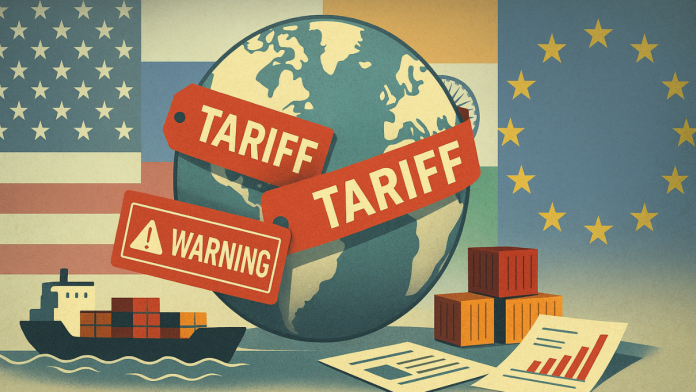Tensions have escalated globally after President Donald Trump announced sweeping tariffs on dozens of countries, including 68 nations and the European Union.
The move has triggered strong reactions from global partners, most notably Russia, which has accused the United States of using trade policy to assert control over independent nations. The controversy deepened after Trump publicly criticized India over its oil trade with Russia, threatening to increase tariffs on Indian goods.
Russia Accuses US of Neocolonial Ambitions
Maria Zakharova, spokesperson for Russia’s Foreign Ministry, launched a scathing attack on the United States, stating that Washington is actively pursuing a neocolonial agenda. According to Zakharova, the US is imposing politically motivated tariffs on countries that choose to follow their own sovereign policies, rather than align with US interests.
She said the newly announced tariff barriers, which range from 10% to 41%, mark a clear departure from America’s historical position as a defender of free trade. Zakharova described the move as an effort to resist the erosion of US global dominance amid the rise of a multipolar world order.
“Sanctions and restrictions have unfortunately become a defining feature of the current historical period,” she said, adding that the US is using economic tools to interfere in the internal affairs of other nations.
India accuses US and EU of double standards on trade with Russia
She also pointed to Brazil, a key Russian partner in Latin America, as one of the main victims of what she called “politically driven protectionism”. Zakharova warned that such tactics threaten to slow global economic growth, disrupt supply chains, and deepen divisions within the global economy.
She also accused Washington of attempting to destabilize independent decision-making by applying pressure through tariffs and sanctions. Zakharova emphasized that Russia will continue working closely with like-minded nations, including BRICS countries, to counter what she referred to as “unlawful and one-sided economic bullying”.
Trump’s Comments Spark Global Reaction
The backlash from Moscow comes shortly after President Trump made controversial remarks about India’s oil trade with Russia. He accused India of buying large amounts of Russian oil and reselling it in global markets for “big profits”. Trump signaled that, as a result, he would be substantially increasing tariffs on Indian goods entering the US.
These comments stirred criticism, especially from international observers who pointed out that both the US and EU continue to engage in trade with Russia themselves. Although India’s Ministry of External Affairs issued a factual response defending its energy policy, it refrained from making direct political statements. The response emphasized that India’s decisions are based on national energy security and affordability.
India also highlighted that its total trade volume with Russia is far lower than that of several Western countries. It cited official data showing that European Union imports from Russia in recent years, including liquefied natural gas (LNG) and industrial goods, far exceed India’s energy purchases.
India maintained that it would continue to act in the best interest of its population and national economy and pointed out that it is unfair to single out its oil purchases when Western nations continue similar trade practices with Moscow.
Global Trade Frictions Deepen
The US’s growing use of tariffs as a tool of international influence is drawing increasing criticism from around the world. Under President Trump, the US has moved away from traditional free trade values, instead embracing a policy of protectionism aimed at securing its strategic interests.
Russia views this shift as a larger strategy to isolate and punish countries that resist aligning with Washington’s geopolitical goals. Zakharova’s remarks underscore a deepening divide between Western powers and countries advocating for independent decision-making in global politics and economics.
As tensions rise, Russia’s message is clear: it will not yield to pressure and will continue building alliances with nations that support a more balanced, multipolar global order.


